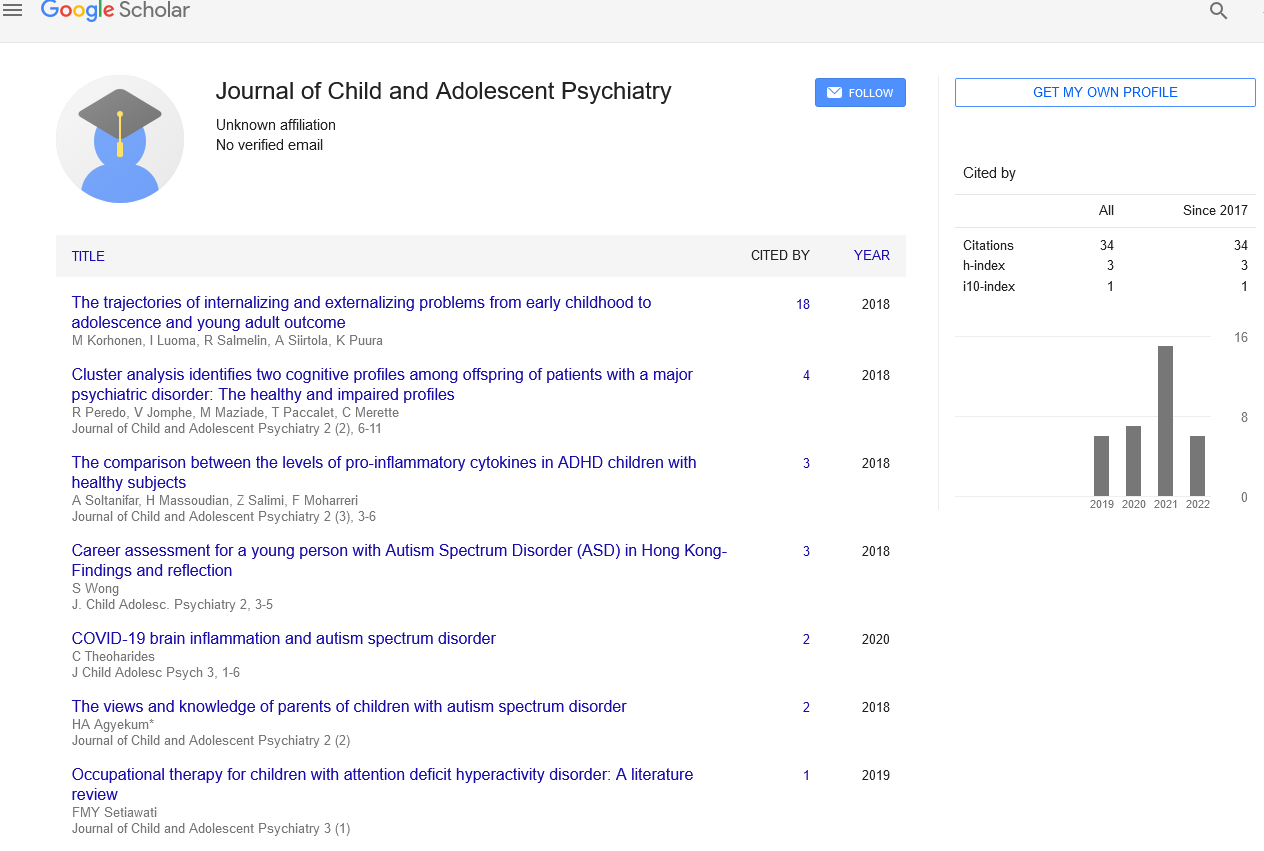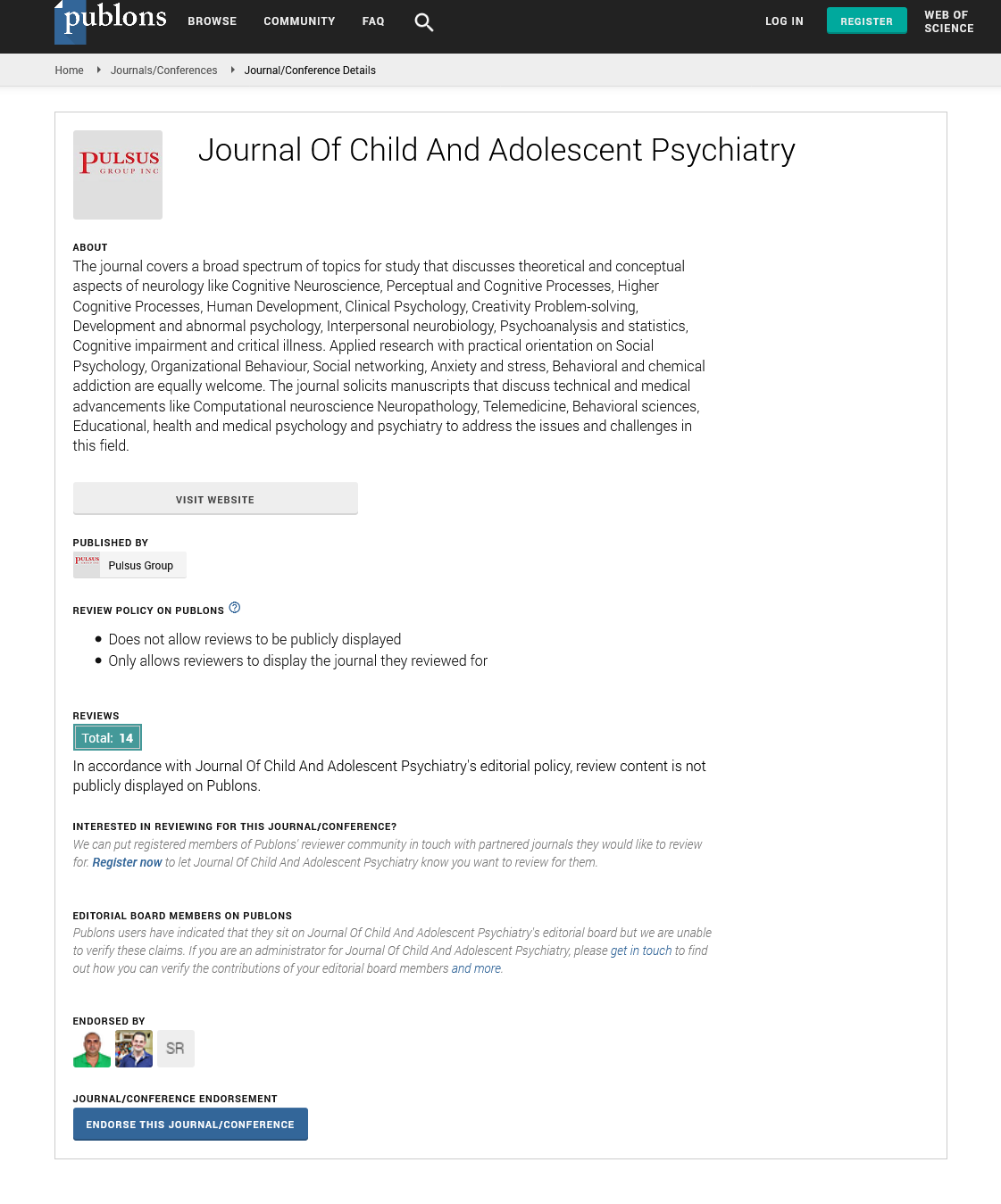Agatha Clemens*
Editorial office, Journal of Child and Adolescent Psychiatry, UK, Email: childpsy@psychiatryres.com
*Correspondence:
Agatha Clemens,
Editorial office, Journal of Child and Adolescent Psychiatry,
UK,
Email: childpsy@psychiatryres.com
Received: 04-Nov-2022, Manuscript No. PULJCAP-22-5938;
Editor assigned: 12-Nov-2022, Pre QC No. PULJCAP-22-5938(PQ);
Accepted Date: Nov 29, 2022;
Reviewed: 16-Nov-2022 QC No. PULJCAP-22-5938(Q);
Revised: 27-Nov-2022, Manuscript No. PULJCAP-22-5938(R);
Published:
30-Nov-2022, DOI: 10.37532/puljcap.2022.6(6);01-02
This open-access article is distributed under the terms of the Creative Commons Attribution Non-Commercial License (CC BY-NC) (http://creativecommons.org/licenses/by-nc/4.0/), which permits reuse, distribution and reproduction of the article, provided that the original work is properly cited and the reuse is restricted to noncommercial purposes. For commercial reuse, contact reprints@pulsus.com
Abstract
In Japan, playing video games is the most popular form of recreation, particularly among boys. Over time, playing video games online has become more prevalent among kids in school. As a result, young children in Japan are now experiencing a serious societal issue due to their excessive online gaming. Previous research has shown that children and teenagers who play too much internet gaming may experience a range of mental health problems. There are more children and adolescents seeking treatment at medical facilities offering child and adolescent psychiatry treatments for a variety of issues associated to excessive gaming. The purpose of this study was to look into how gaming disorder (GD) is being treated in therapeutic settings in Japan.
Keyword
Functional motion disorders,Taijin kyofushoIntroduction
The most popular pastime for kids and teenagers in Japan,particularly among boys,
is playing video games. 85.0% of respon--dents to a national study (n=5,096)
admitted to playing games at
least once in the previous 12 months, with 92.6% of men and
77.4% of women. Nearly half of all respondents (48.1%) said they
play games primarily online. In recent years, younger people are
starting to use the Internet. 33.7% of children aged 10 and younger,
62.6% of children aged 2, and 82.3% of children aged 6 accessed the
Internet for any reason, according to a large-scale poll of parents of
children under 10 (n=2,294). The same survey's findings revealed that
82.0% of kids (n=5,805) under the age of 17 played games online.
72.4 % of primary school kids (n=1,101) have access to the Internet
through video game consoles. Nakayama et al. cautioned that their
survey's findings (n=549) showed that the risk for problematic gaming
was positively correlated with the younger the age at which weekly
gaming began, despite the fact that playing online games has become
increasingly prevalent among school-aged children over time. When
considered as a whole, excessive online gaming by young children in
Japan has developed into a serious social issue.
Additionally, because gaming disorder (GD) was added to the
International Classification of Diseases, Ninth Revision as a
psychiatric disease, An abundance of online gaming has been
linked to neurodevelopmental issues like autism spectrum
disorder (ASD) and attention deficit hyperactivity disorder,
according to earlier research (ADHD). According to Ostinelli et
alsystematic .'s review and meta-analysis, about one-third of those with
GD also reported depression. Teenage problematic gaming was linked
to despair and anxiety, according to a large-scale cohort study in
Sweden. According to certain brain imaging studies, GD and
depression may have a similar aetiology .Japan has also observed
physical and psychological problems following teens' excessive gaming.
Regarding neurodevelopmental diseases, a comprehensive evaluation
of 1,028 previously published publications revealed that GD
symptoms and ADHD symptoms were consistently linked.
The rise in cases of school refusal and absenteeism, many of which
appear to increase during adolescence and frequently progress to the
stage known as "hikikomori," a condition characterised by severe
social withdrawal, has caused long-standing and unresolved issues for
mental health professions in Japan. Hikikomori was initially thought
to be a sickness that was connected to Japanese culture (28). Shame
and amaze, which refer to the acceptability of excessively dependent
behaviours, have historically characterized the culture backdrop of
Japan. Taijin kyofusho, a severe kind of social anxiety, may be caused
by this equally culturally tied disease. However, as more and more
publications on hikikomori are published in English, there have been
progressively more cases of hikikomori recorded outside of Japan.
There have been reports of psychological variables related to the
genesis of hikikomori outside of Japan, including shyness,
avoidance tendencies, introversion, and loneliness. These
psychological elements are all very closely tied to Internet addiction.The Internet makes it possible for people who exhibit these
psychological traits to locate a place that is both normative and
comfortable, which in turn motivates them to stay there. A
possible connection between hikikomori and GD has been
raised by recent investigations. It is not surprising that there is a
major association between hikikomori and
GD where regulations are lax and cultural as well as individual, given
how many kids and teenagers utilise the Internet to play online games
with both society and parental support.






